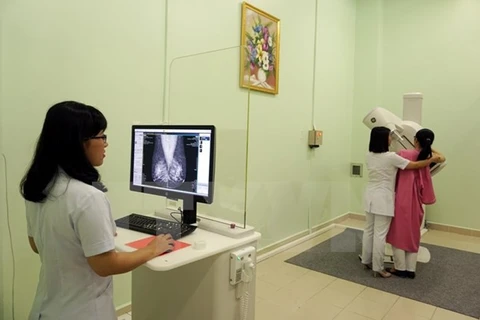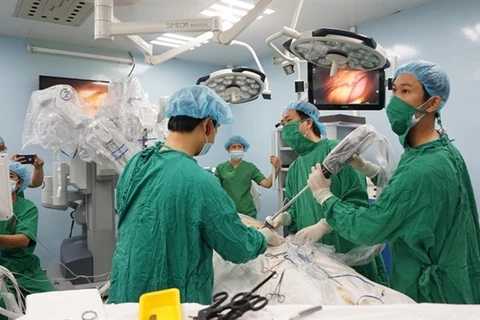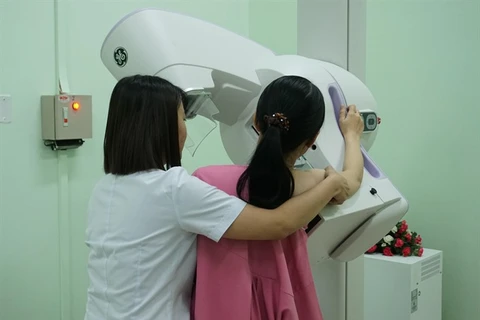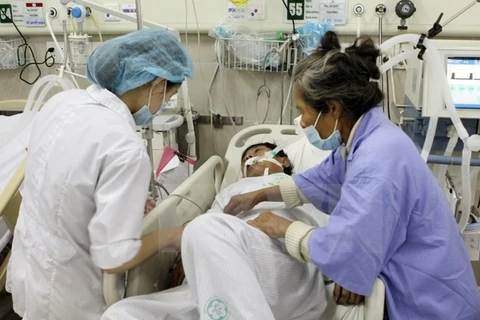 Doctors at Bac Ninh General Hospital use high-frequency sound waves to treat a patient with liver cancer (Photo: VNA)
Doctors at Bac Ninh General Hospital use high-frequency sound waves to treat a patient with liver cancer (Photo: VNA)HCM City (VNA) – Vietnam’s national cancer control strategy needed to address the serious problem of infectious agents, which cause more than 20 percent of malignancies in the world, said Prof Nguyen Chan Hung, Chairman of the Vietnam Cancer Society.
Speaking at a recent conference held in HCM City, Hung said the rate of infectious diseases in developing countries was four times higher than that in developed countries.
He claimed several infectious agents were linked to some of the most common cancers.
Helicobacter pylori (H.pylori), which causes chronic inflammation in stomach and duodenum, is a common cause of ulcers, while hepatitis viruses B and C and the human papillomavirus (HPV) can also cause cancer.
H. pylori infections and viral hepatitis are agents for gastric and liver cancers, while HPV infections can cause not only cervical cancer but also anal, oropharyngeal, vulval and penile cancers.
“Appropriate policies for prevention of infectious diseases would help open doors for cancer control. We have a good opportunity for cancer control by eliminating some infectious agents,” Hung said.
Vietnam has vaccines against hepatitis B virus and HPV, which help prevent infection, he said.
Figures from the Thai Nguyen Oncology Centre showed that the number of patients with infectious diseases at the centre had doubled between 2012 and 2016.
The role of molecular biology was also highlighted as it was a potent tool to make new medicines for breast and lung cancer.
Health experts from oncology hospitals and centres said they had performed invasive surgeries that had resulted in a high level of preservation of healthy cells in patients with cancer.
Advanced radiotherapy techniques used to improve accuracy in treatment did not affect healthy cells around the cancerous cells.
According to Professor Hung, leading causes of cancer today are smoking and cigarette’s smoke, followed by unhealthy lifestyles, eating and the infection (viruses, bacteria, parasites).
“There are solutions for these causes, there are vaccines, but most importantly, humans must know to avoid the causes in the first place,” he said.
According to Hung, many people think hepatitis B or C is normal and not much attention is needed, but this negligence ultimately results in cancer.
Cigarette smoke, aside from the well-known lung cancer, also contains 75 powerful carcinogens that can cause 15 cancers.
He also advised against consumption of fatty meat, salty food or oily dishes, and recommended higher intake of vegetables and fruit.
Sharing the same viewpoint, Professor Nguyen Tan Binh, Director of the HCM City’s Department of Health, said that 40 percent of the causes of cancer could be prevented if advocacy and awareness campaigns were effective.
“In 2016, at a conference held by World Health Organisation on the medical achievements made in the West in 50 years, the most important element that it recognised was convincing people to give up smoking,” Binh said.
Dr Tran Van Thuan, Director of the K Hospital, under the management of the Ministry of Health, said the most important element in the fight against cancer was early detection.
In K Hospital, for example, screening techniques for nine types of popular cancer (in both men and women – breast cancer, cervix - ovary, liver, lung, stomach, colorectal, nasopharynx, thyroid, prostate) were conducted. Each screening test cost the patient only 2-3 million VND (87-131 USD), a price range affordable to most people.
According to experts, Vietnam records 94,000 deaths from cancer each year. Most cancer patients only come to hospitals when the disease has reached later stages, making treatment more complicated and costly.
“The new technologies to early detect cancer have been adopted by most leading hospitals in the country. K Hospital and some other medical centres in the country have started to make use of a biology bank to aid research and control cancer,” Thuan told Thanh nien (Young People) newspaper.
Professor Ta Van To, director of K Hospital’s Pathology and Molecular Biology Ward, said the biology banks preserved cancer tissue samples for a long time at sub-zero condition (minus 80 degrees Celsius). These samples were used in research on drug resistance and drug resistant genes.
Tran Thi Nhi Ha, deputy director of Hanoi’s health department, said the capital city was the first in the country capable of providing a complete package for rectal cancer – from early screening, diagnosis, to counselling and treatment.
Since May, Saint Paul Hospital has conducted two mass screenings for rectal cancer in 100,000 people at elevated risks (over 40 years old) in eight districts and townships in the city. Six per cent of those screened tested positive, Ha said.-VNA
VNA
























